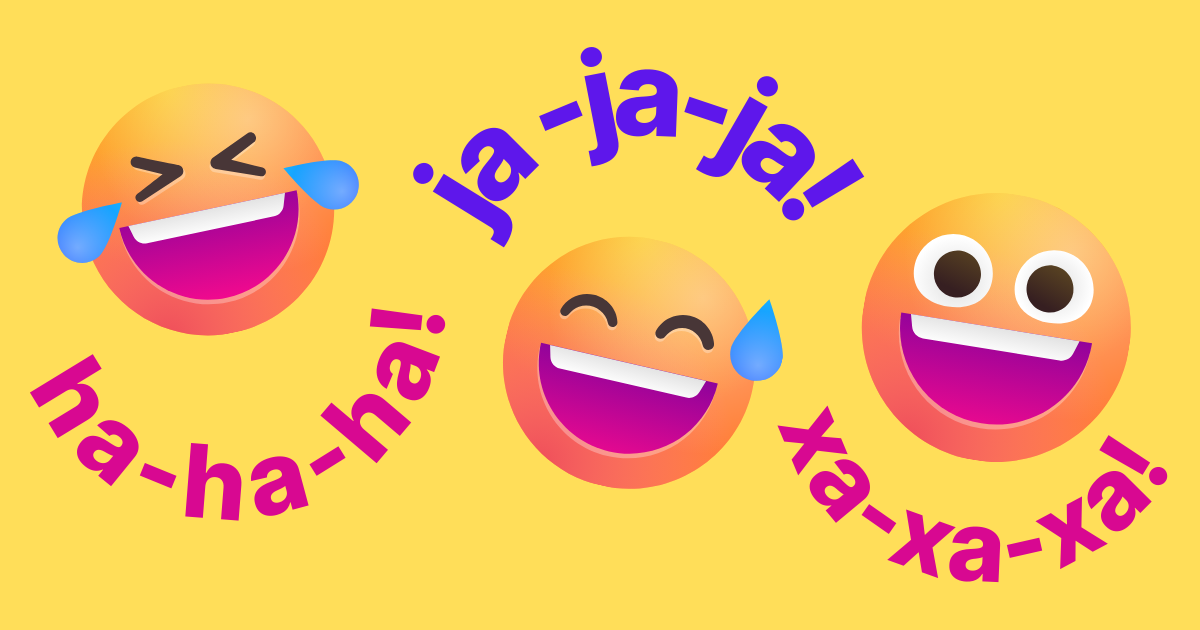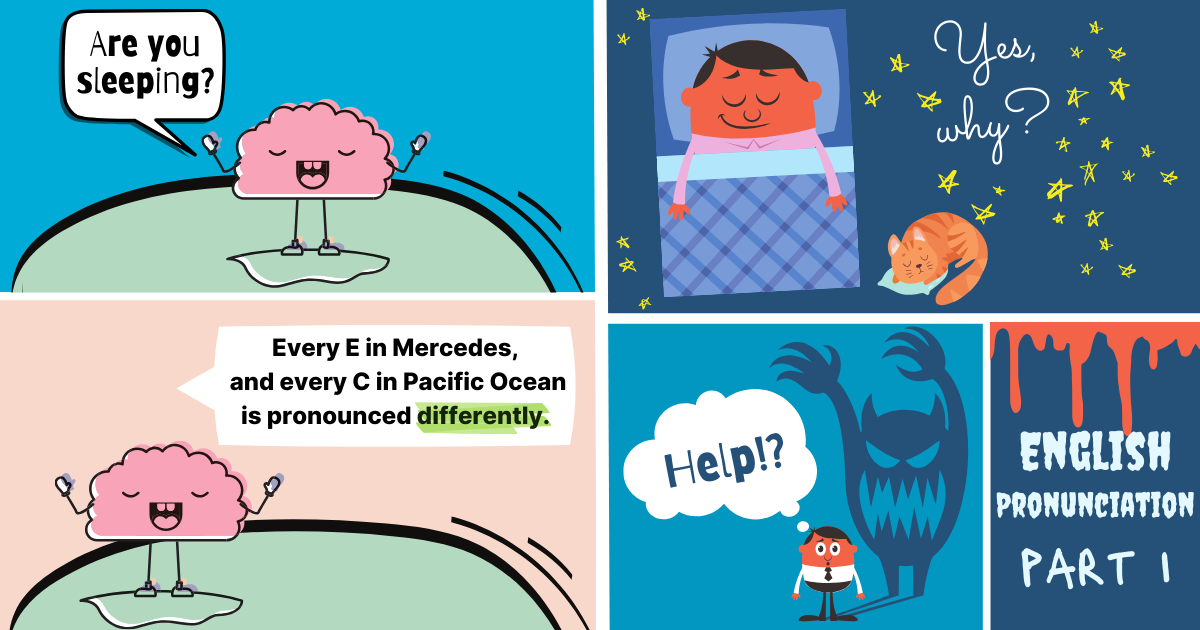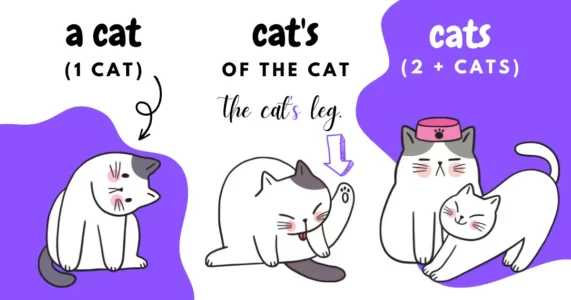Yes, the title says rules but, in reality, when it comes to pronunciation and spelling in English, that is not the correct term because there are too many exceptions and contradictions. There are patterns that can help learners understand the logic behind spelling and pronunciation in English.
In the following series, we will focus on these patterns and try to shed some light on this mystical creature called English pronunciation.
Before we talk about some letters (specifically the vowels in English), let’s briefly mention a few important things about spelling and pronunciation.
Learners’ background
The “linguistic background” (if we can call it that) of learners as well as the knowledge they have about the new language they are starting to learn are, perhaps, the two most important things to consider. It is true that technologies have made things much more accessible, and most learners are fully aware of Latin letters, specifically, the English alphabet. However, there still may be many other confusions and challenges, especially among very young or inexperienced learners.
Most commonly, these are related to sounds rather than letters. After all, English is notorious for its challenging pronunciation for a reason.
For example, when working with people who use only the Cyrillic alphabet, which is “currently used exclusively or as one of several alphabets for more than 50 languages“, it may be challenging because some letters look the same, or at least very similar, but produce quite the opposite sounds.
The Latin letter Pp [p] has a Cyrillic counterpart, and although the letters look the same, they produce different sounds altogether.
While Pa (short for father) in English is pronounced [pɑ], the same Ра written in the Cyrillic alphabet is pronounced roughly as [rɑ], with a strong r sound, and it stands for Ra, the god of the sun.
Not to mention that sometimes some vowels (a, o, e, etc.) look the same, but the sounds they produce in English can be unexpected for a learner of such background and no experience.
- The Cyrillic letter A usually only produces a sound similar to the Aa in father [ˈfɑðər], but nothing like Aa in water [ˈwɔtər], or Aa in plate [pleɪt].
- E almost always sounds like the E in step [stɛp] and never like E in the verb to be [bi]. O sounds like O in strong [strɔŋ] but not like O in to [tu].
- The consonants C and X present similar problems. Learners of the background mentioned above pronounce C as in the word city [ˈsɪti] but never like C in the word car [kɑr]. They have a separate letter for that – К.
- The letter X is a different story because, from the standpoint of a person who speaks a Slavic language that uses the Cyrillic alphabet, it sounds like the letter H in hold [hoʊld] and not at all like the sound we hear in the word tax [tæks]. For the sound [ks], you need to combine the letters К [k] and С [s]from the Cyrillic alphabet.

There are many more examples, but the above is enough to make a few points and describe things in general. Keeping an open mind and remembering that it is not impossible to learn, no matter how hard it may seem, let’s jump to the following sections.
Homophones
In short, homophones are words that sound the same but are different.
Sometimes words that sound the same are spelled differently and mean different things. Context is the only way to understand which one the speaker means.
*To illustrate the (American English) pronunciation, we use the International Phonetic Alphabet (IPA) generated by the toPhonetics website.
For example:
FLOWER [ˈflaʊər] vs. FLOUR [ˈflaʊər]

- What a beautiful flower [ˈflaʊər]!
- To make pasta from scratch, you’ll need flour [ˈflaʊər].
Remember! The word flour doesn’t have a plural.
- flower – flowers✅
- flour – flours❌
I [aɪ] vs. EYE [aɪ]
- I [aɪ] have something in my eye [aɪ].
- I [aɪ] rubbed my eye [aɪ] because it felt itchy.
- I [aɪ] covered my eye [aɪ] with my hand.
TO [tu] vs. TWO [tu]
- I always get some coffee on my way to [tu] work.
- I have two [tu] cats.
BY [baɪ] vs. BUY [baɪ] vs. BYE [baɪ]
- I’ll come by later this evening. ✅
- I need to go to the store and buy some food. ✅
- See you later! Bye! ✅
Homographs
Simply put, homographs look the same but are different.
Many words are spelled the same way and sound the same but have different meanings. Again, we need context to decide which is which.
The word leaves is a good example of a homograph.
- He leaves [liːvz] for work at 7.30 in the morning. ✅

The path was covered with leaves [liːvz]. ✅
Here are some more examples:
CAN [kæn]
The word can has two meanings and uses.
- verb – to be able to do sth
- noun – a metal container
- Of course, I can cook!
- I need a can of tomatoes.
FALL [fɔl]
The word fall [fɔl] has two meanings, too.
verb – to go from a higher to a lower level usually unwillingly

I am afraid I might fall.
noun – the act of falling; the season when leaves fall from trees
- I am going on vacation this fall [fɔl].
BEAR [bɛr]
The same can be said about the word bear.
noun – a large animal with thick brown fur
- The Panda bear is my favorite animal.
verb – to carry, to endure
- I can’t bear his sarcasm anymore.
Vowel names
The letters in the English alphabet have names, and that is usually the first thing a student learns, their ABCs, right?
Sometimes, letter names coincide with (one of the sounds) the letter makes.
For example, it is safe to say that the vowels (except for the semivowel Y) produce the same sounds as their names when found in an open syllable (meaning there is no consonant after the vowel within the syllable 💁🏽).
Let’s have a look below. (Here, the focus is on vowels, not all letters.)
The vowel A [eɪ]
There are more than 5 ways to pronounce the letter A, but here we will only focus on the pronunciation as in the letter name when A [eɪ] stands alone in open-syllable words.
The sound [eɪ] in English is very common, and it can be produced when different letters (specifically, vowels) are combined, for example, AI as in mail, EI as in eight, etc.
To learn more about in what other cases A is pronounced as [eɪ] jump over to the “English pronunciation 1.1: The Letter A as in [eɪ]” article (opens in a new tab.)
- trace [treɪs]
- embrace [ɛmˈbreɪs]
- reputation [ˌrɛpjəˈteɪʃən]
The vowel O [oʊ]
The vowel O in English, compared to other languages, can also be pronounced in more than one way.
For example, O in stop [stɑp] and drop [drɑp] is not the same as in slope [sloʊp] or cope [koʊp], and that is what we focus on here.
More examples of the letter O as [oʊ]
- stroke [stroʊk]
- closed [kloʊzd]
- moment [ˈmoʊmənt]
- probation [proʊˈbeɪʃən]
Example sentences:
- The store is closed.
- One moment, please!
The vowel U [ju]
The same can be said about the U – it too can be pronounced differently. But here, we focus only on when it is pronounced as its name (ju) which is usually when in an open syllable.
- tube [tjub]
- evaluate [ɪˈvæljuˌeɪt]
- monument [ˈmɑnjumənt]
- The largest monument in the world is the Statue of Unity.
The vowel E [iː]
E is no exception. When in a closed syllable, it sounds different than its name [iː], for example, step [stɛp], dress [drɛs]. Below are examples of words where the letter E is pronounced the same as its name.
- legal [ˈliːgəl]
- ego [ˈiːgoʊ]
- people [ˈpiːpəl]
- region [ˈriːʤən]
- Do you know how many people live in the UK?
The vowel I [aɪ]
And again, we will notice the same thing here. The letter I, in a closed syllable, is not pronounced as its name [aɪ]. Some examples are tip [tɪp] and lip [lɪp]. Otherwise, it goes by its name.
- file [faɪl]
- time [taɪm]
- climate [ˈklaɪmət]
- We need to hurry. We don’t have much time left.
Where to go from here?



